In a time when all schools were shut, we took the schools to the children!
An insight into the Satellite Learning Centers organized by the Child Labor Elimination Program at Hand in Hand India.
The pandemic has immensely affected the livelihoods of billions of people in this past year. Numerous businesses and sectors were affected, but the most affected would be the education sector. Due to the multiple lockdowns imposed by the Indian government to control the spread of the Covid-19 virus, academic centers shut down, and everyone turned to e-learning platforms. But there was a big gap and many assumptions made when schools turned to zoom and google calls.
This assumption was that everyone (child or parent) owns at least one electronic device to access the digital platforms. World Economic Forum states that close to 350 million students were affected by the pandemic lockdowns. Not all of them were able to access the e-learning platforms due to various technical issues.
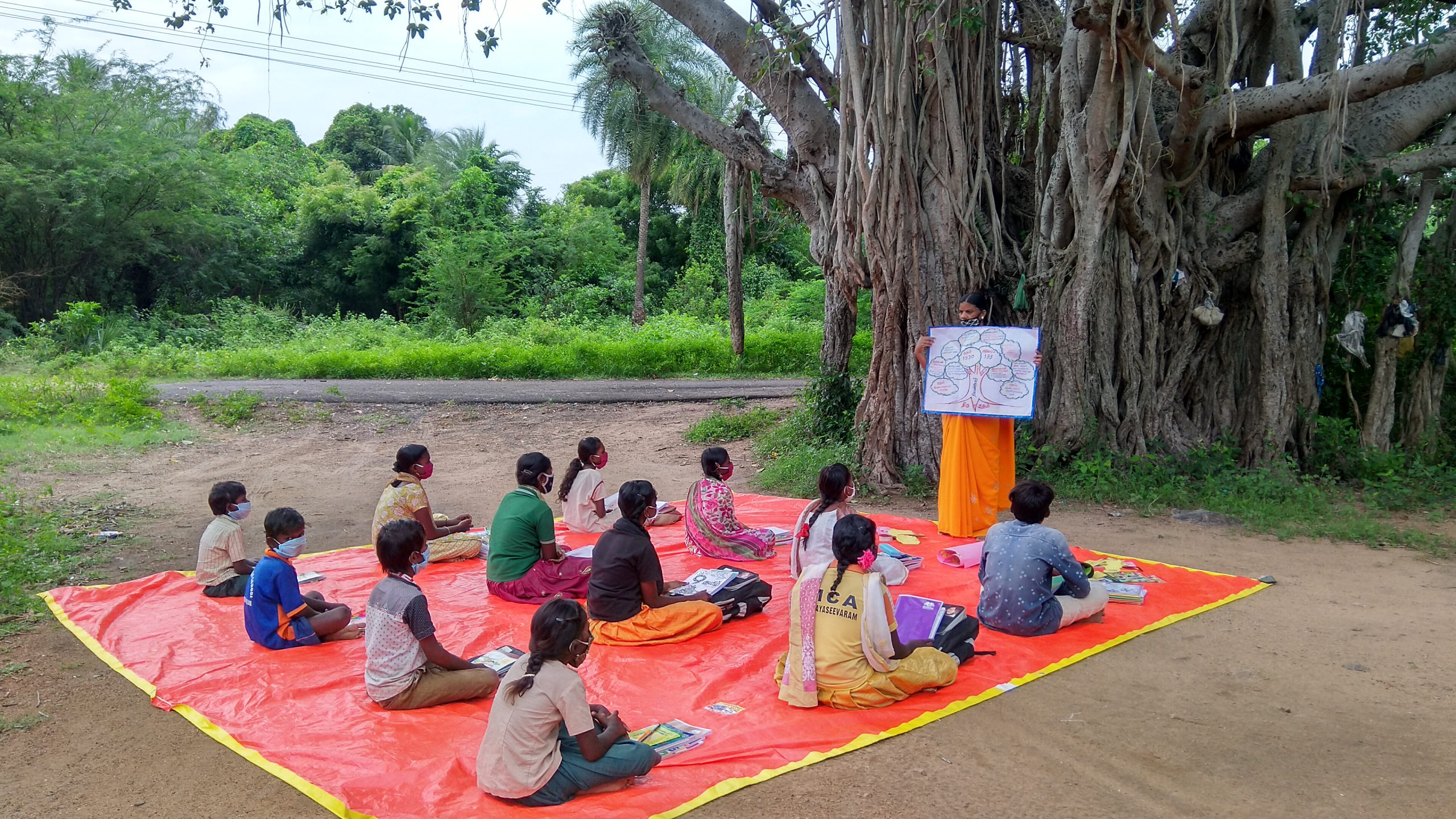
Detached: Rural India
Electricity and Internet access are the key aspect of online learning. However, only 47% of Indian rural households have over 12 hours of electricity and over 36% of India's schools don't have electricity. The pandemic only increased problems and took rural India back in time to a place with little or no access. Moreover, with schools shut down and with parents losing their jobs due to the pandemic, most families are left with very few options to make a living and feed the members. Due to this fact, a great many families are equipping the children to work with them at factories and on farms. This action is affecting the several years of progress made in curbing child labor and the eventual fate of India's future generation.
The Child Labor Elimination and Education Programme
At Hand in Hand India, we noticed this gap and hence strived to help the children from our Residential Special Training Centers (RSTC), especially run for vulnerable children to stay up to date with classes and the reading materials. The aim is to eliminate child labor and ensure that it remains that way. The children from the RSTC’s were sent home with their parents when the lockdown was induced by the government
The Child Labor Elimination Program (CLEP) of Hand in Hand India, organized for surveys to be taken of these children to assess their learning skills. The surveys were conducted at their villages, even covering interior remote places since children were not attending regular classes at the center. The surveys were conducted by volunteers and the RSTC teachers. They went from door to door and provided the children with assessment sheets and conversed with the parents to understand the situation they were in during the lockdown. All Social distancing protocols and measures were taken to ensure the safety of everyone present.
The survey’s results showed that the learning levels of the children, during the lockdown, had fallen back to where they were when they started learning at the RSTC's prior to the lockdowns. The team in Madhya Pradesh also noticed that the migrants resumed the practice of taking their children to the farm for extra help and earn extra money for living expenses. The reason provided to the team was that the children could not be left alone at home when the parents were at work as it was not safe. The families state that they had no option but to take the children to work with them.
The Solution: Let’s take the School to the children
Taking all these into a note, the CLEP team decided to have remote Satellite Teaching Centers (STC) conducted for the children who are unable to attend the e-learning platforms. When the children could not access schools, we brought the schools closer to them.
The centers were first conducted for the RSTC students but in no time the team observed that the Non-RSTC students or ‘Covid Dropouts’ i.e. students who were unable to attend online classes as they have no access to schooling, internet, or electricity. Along with these two categories of students, the centers also comprised all other dropouts in the community, people who couldn’t finish their studies due to numerous personal, social, and cultural reasons.
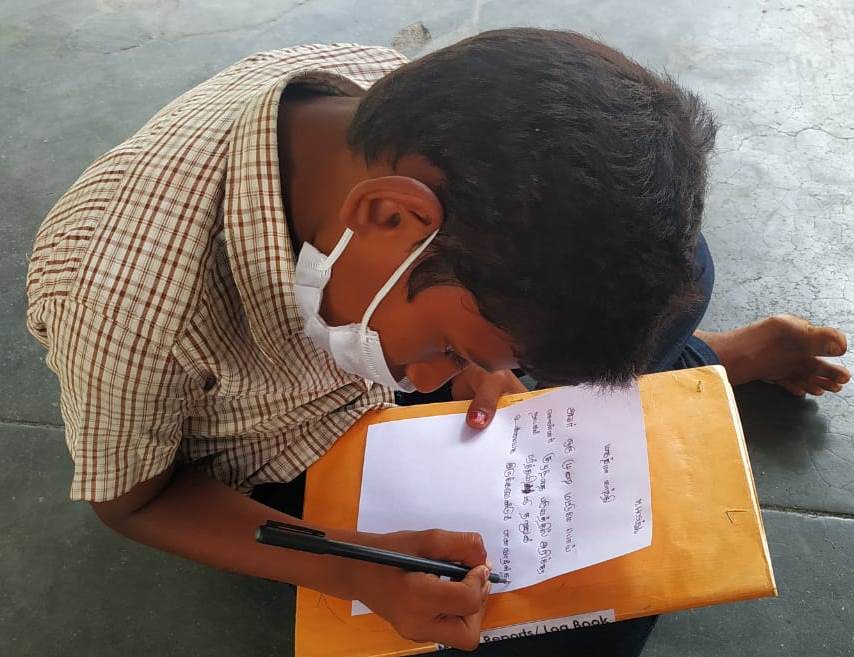
The classes are conducted for two hours every day where the Teaching & Learning Materials (TLM) is provided to the students. The teachers and volunteers are also provided with training to ensure that they are proficient and skilled in their teaching methods. The classes take place in batches to ensure that every child has ease of access and to ensure their safety during the pandemic. The CLEP team mapped the locations of the children and set up centers in and around those areas.
Some centers are conducted in government schools, in government buildings while some take place even on open grounds or under the shelter of trees. The teachers and volunteers traveled on their own vehicles to the locations as there was no public transport due to lockdowns. Some even traveled close to 50kms each way, to teach and help these children. At the STCs, all of the Covid-19 protocols were followed, the kids were provided with masks, sanitizers were present, children washed hands before entering the STC for the day and social distancing precautions were taken to ensure the child and the teachers' safety.

The STC's are currently active in two states namely Tamil Nadu and Madhya Pradesh. Combined currently we have 114 active centers with 1555 children attending classes every day in batches. It was noted by the CLEP team managers of all districts that the children are eager to join the classes, and that the parents are also encouraging and supporting the teachers to take up more students and help more people.
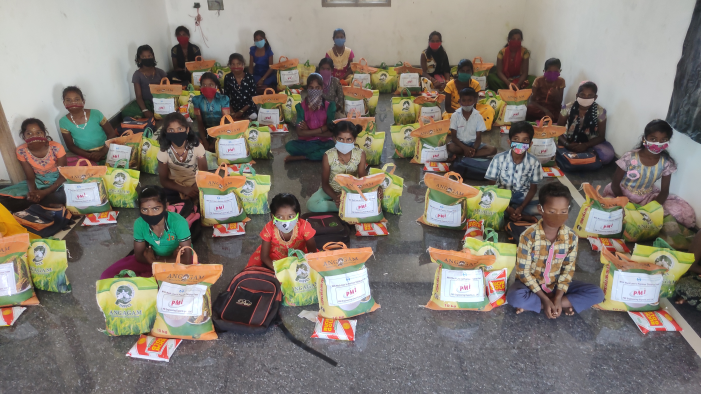
To ensure that the families and the children are well-fed and that they get the necessary nutrients, the CLEP team distributes groceries to families with the help of donors. The other crucial reason for the distribution of groceries was to ensure that the families have all the essentials needed and that the necessity to have the children sent for work to earn an income would be non-existent. If the groceries were not provided then one would notice a sharp rise in child labor, as that parents would have fewer options left to earn a living and to put food on the table.
The grocery kits included – 5kg wheat flour or Rice (MP & TN, respectively), pulses, oil, rice, masala items, salt, etc. The CLEP team has distributed grocery kits to 137 RSTC Children to date.
That Extra Mile!
In the Vellore district, some classes take place in the Anaikattu hills, where the tribal community resides. They do not have regular access to the plains, and hence the STCs were arranged on the hills. The teachers here are volunteers who are part of the local community and are not RSTC teachers. The volunteers are 10th or 12th pass students who are given proper and vigorous training to enable them to teach the kids in the region.
The kids who could not make it to regular classes due to geographical reasons are provided with electronic tablets to attend the online courses. These tablets are donated to the students by various donors and well-wishers. There are also dance lessons offered to the students in this region by fellow students who have acquired training. Two students namely Shalini and Rekha voluntarily go around all schools providing dance lessons so that the other students could participate in various cultural programs and competitions. They also conduct classes for primary school children studying in STCs.
Fun incorporated into Learning
The children at STC’s participate in extra-curricular activities to ensure that their minds are free and they get a break from all the learning. These activities enable the students with new skills and art forms. The kids take part in tournaments and competitions to demonstrate these skills. The extra-curricular activities provide recognition to the students when they step out into the real world. The children at STC’s are supplied with Sports kits and materials for the extra-curricular activities. The CLEP team along with the assistance of donors has provided 13 STCs with sports kits benefitting 240 children.
At the STC's, the children are provided with ‘movement breaks’ where they choose a game or activity of their choice and play with, learn and build skills, in between classroom sessions to give them a break. The team noticed that the children's attendance rate and their span of attention had been increased considerably within one month of this practice. In Chengalpattu and Tirupur districts, the children were provided with some craftworks to design greeting cards. The kids used their thoughts and ideas to create colorful and beautifully worded cards for the donors in and around the area.
These cards were then handed over to the donors by the CLEP team, extending festival wishes from the kids. Apart from the above-mentioned activities, there are many new initiatives introduced in the STCs for the children to benefit, enjoy and learn. The STCs have regular classes conducted on Yoga, Arts & Craft. The children are also provided with the opportunity of taking part in Online Quiz competitions, Book festivals through puppet shows, Food festivals, Pottery. There is also training conducted on the usage of laptops and email communication.
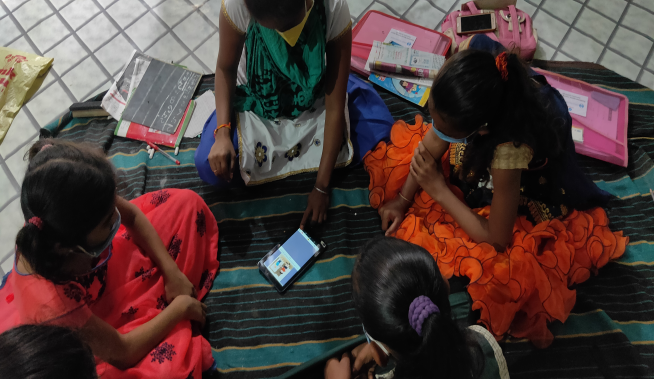
The teachers also use crafts to make the daily studies more exciting and eye-catching for the students. Teachers use craftworks and cutouts to teach students alphabets, poems, and even storytelling sessions have crafts utilized to enhance the attention span of the children and their interests. The teachers at Kanchipuram and Thiruvallur districts used craft paper to create palm leaf (Ollaichuvadi) manuscripts of 'Thirukural' for the children. The CLEP team also has QR codes embedded on the back of learning materials for the children to scan and access extra reading materials and works when necessary. 3D animations are also accessible for the students to understand how animals and creatures behave and react.
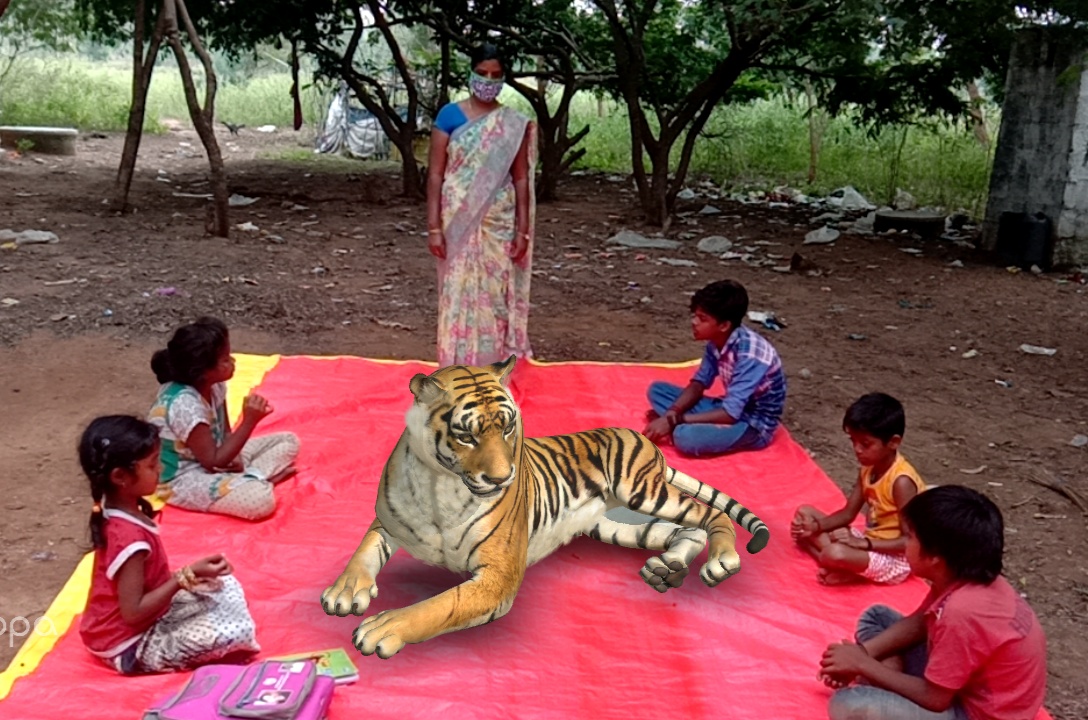
The teachers, field staff, and donors are the backbones of the CLEP team in Hand in Hand India; they ensure that the utmost care and attention are given to every child. They ensure that these children turn into responsible adults and create their own space in this world. At Hand in Hand India, we are nurturing the future generation of the country and making sure that we play, no matter how small a part, in helping the most vulnerable children establish themselves and have a chance at seizing opportunities in this world.
The CLEP team will continue with the satellite teaching centers until all lockdowns are lifted and educational centers are open. The team took the classrooms to the children when the schools were not safe anymore. The team proved that anything is possible with determination and a great deal of enthusiasm. The CLEP teams, through an orderly approach and timely mediations, have ensured that none of the RSTC children have returned to child labor in this difficult time and are followed up at regular intervals.
Hand in Hand India works across India in the area of Child Labour Elimination. In addition to our residential special training centres for child and bonded labourers in Tamil Nadu and Madhya Pradesh, we run 2 schools for first-generation learners in Kanchipuram. Through our initiatives, more than 3 lakh children have been mainstreamed into formal Government schools and have converted more than 1000 panchayats (groups of villages) into child-friendly ones. Read more about our work here.






